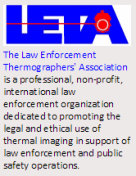







LETA’s Formation and MIssion Statement
The Law Enforcement Thermographers’ Association was incorporated as a non-profit, international law enforcement organization on November 2, 1995. LETA had been 2 years in the formulation process and was founded as a primary training organization, focused on the specific field of Thermal Imaging in Law Enforcement. The Law Enforcement Thermographers’ Association is a professional law enforcement organization dedicated to promoting the legal and ethical use of thermal imaging in support of law enforcement operations. LETA presently hosts four levels of training for thermographers. Membership is open to all law enforcement personnel, including local and state prosecutors and United States Attorneys or equivalent in other nations, law enforcement product industry representatives, and active Military and National Guard personnel assigned to law enforcement or investigative duties. It is the express resolution of the LETA Board of Directors that LETA not compete with existing law enforcement associations, or agency training programs, but to act in concert with them and provide certified training to their members who are currently utilizing this important science. A majority of federal and state appellate courts have ruled favorably regarding thermal imaging as an important law enforcement tool. However, four state courts, Washington, Montana, California, and recently Pennsylvania have issued conflicting rulings, in the mistaken opinion that thermal imaging is intrusive, which it is not. In the many favorable state and federal court opinions, which have been in support of warrantless thermal imaging, the courts have relied on a select few expert witnesses from the law enforcement and thermal industry communities. In several of these cases the courts have commented on the training and expertise of the operator. In the 1993 New York case of U.S. v. Casanova, the court stated emphatically that training, certification, and level of expertise of the operator was paramount. Numerous Law Enforcement units throughout the United States and allied countries have access to this very technical equipment but have received only rudimentary "switchology" as training. Most units are unaware of any standards and protocols regarding thermal imaging, nor fully utilize the (11) current applications recognized by the courts. Neither do most law enforcement training programs provide a "certified" course in thermal imaging. LETA is filling that gap, giving overworked training divisions an option to send selected candidates to a fully certified thermal school. It is because of the above lack of certified training, proper networking, and the need for advanced ratings that LETA was formed. Constant, updated legal briefings are sorely needed and new applications need proper testing prior to practical use in the field. For example, clandestine methamphetamine laboratories do not present a unique thermal signature but many agencies have been told differently. LETA currently has two levels of certification: Basic and Instructor. These courses are approved by various peace officer standards and training organizations throughout the United States and Canada. LETA. has obtained permanent P.O.S.T. certification on the West Coast. LETA also has gained C.L.E.E.T. certification in Oklahoma (which is reciprocal in Missouri and Arkansas), T.C.L.E.O.S.E. in Texas, F.D.L.E. in Florida, and M.S.P. certification in Montana. Other state certifications include Wisconsin, Michigan, Maryland and South Dakota with Tennessee and Indiana pending. In addition, the Drug Enforcement Administration and the Federal Bureau of Investigation recognize our courses. The LETA training manual is undergoing its fifth revision and printing. Standards and Protocol for the legal and ethical use of thermal imaging in support of law enforcement have been adopted and are posted to this web site. Also, a newsletter called the "HOTSPOT" has been published and this web site brought to you. In these times of extreme scrutiny by the courts, media, and defense bar of every law enforcement action; we who hold the public trust must re-evaluate some age-old practices. Specialized training in the technical tools we possess, updated training manuals, and advanced ratings are only a few examples of reasons for the formation of associations such as LETA. LETA. experienced a busy first year in 1996. On May 20-24, LETA held its first Basic Thermographers School at Camp Gruber, Oklahoma. Over twenty law enforcement personnel and industry representatives attended this history-making course. That same year, LETA conducted numerous police officer training sessions and an annual convention at South Lake Tahoe in October. At this first annual national conference, LETA enrolled 96 students in the Basic Thermographers Course, 64 in the Advanced Thermographers Course, and 14 in the Instructor Course. During its second year, LETA did not loose any of its momentum. In May of 1997, the first of three LETA. Basic Thermography Courses were presented in Canada. Hosted by the Royal Canadian Mounted Police, over 100 Canadian police officers were trained to LETA standards. On September 22-26, 1997 LETA hosted its Second Annual Training Conference and Exposition at the Horizon Casino/Resort at Stateline, Nevada. During this conference, LETA offered four levels of training and attracted 135 police officers, agents, guardsmen and industry representatives. LETA experienced a busy first two years, conducting 24 schools within this timeframe. LETA has received many requests from foreign nations to train their police officers. To accommodate these requests and keep up with U.S. officer training, we will need more professional trainers dedicated to enhancing the LETA training staff. The LETA Instructor Course is offered each year during the LETA Annual International Training Conference. The LETA Board is constantly seeking experienced thermal imager operators (previously certified as Basic by LETA or D.E.A., and Advanced by LETA to join the LETA instructor cadre. Energetic persons who enjoy teaching and are willing to organize and conduct LETA certified courses are encouraged to apply. Instructor candidates must submit a written request and lesson plan to, and be approved by, the LETA Board of Directors. Law enforcement personnel, including local and state prosecutors and United States Attorneys or equivalent in other nations; law enforcement product industry representatives; and active Military and National Guard personnel assigned to law enforcement or investigative duties interested in becoming members may click on the Membership Application button on the home page. Print the application directly off the page or click on the MS Word application button and print it that way, then mail in with your payment to: LETA., P.O. Box 6485, Edmond, OK 73083-6485. Thank you for your interest in LETA and taking the time to visit our web siteFAQ
Non elit mollit in magna tempor dolor ut veniam ut, deserunt mollit anim. Irure nostrud sunt ipsum id aliquip dolore.








LETA’s Formation and MIssion Statement
The Law Enforcement Thermographers’ Association was incorporated as a non-profit, international law enforcement organization on November 2, 1995. LETA had been 2 years in the formulation process and was founded as a primary training organization, focused on the specific field of Thermal Imaging in Law Enforcement. The Law Enforcement Thermographers’ Association is a professional law enforcement organization dedicated to promoting the legal and ethical use of thermal imaging in support of law enforcement operations. LETA presently hosts four levels of training for thermographers. Membership is open to all law enforcement personnel, including local and state prosecutors and United States Attorneys or equivalent in other nations, law enforcement product industry representatives, and active Military and National Guard personnel assigned to law enforcement or investigative duties. It is the express resolution of the LETA Board of Directors that LETA not compete with existing law enforcement associations, or agency training programs, but to act in concert with them and provide certified training to their members who are currently utilizing this important science. A majority of federal and state appellate courts have ruled favorably regarding thermal imaging as an important law enforcement tool. However, four state courts, Washington, Montana, California, and recently Pennsylvania have issued conflicting rulings, in the mistaken opinion that thermal imaging is intrusive, which it is not. In the many favorable state and federal court opinions, which have been in support of warrantless thermal imaging, the courts have relied on a select few expert witnesses from the law enforcement and thermal industry communities. In several of these cases the courts have commented on the training and expertise of the operator. In the 1993 New York case of U.S. v. Casanova, the court stated emphatically that training, certification, and level of expertise of the operator was paramount. Numerous Law Enforcement units throughout the United States and allied countries have access to this very technical equipment but have received only rudimentary "switchology" as training. Most units are unaware of any standards and protocols regarding thermal imaging, nor fully utilize the (11) current applications recognized by the courts. Neither do most law enforcement training programs provide a "certified" course in thermal imaging. LETA is filling that gap, giving overworked training divisions an option to send selected candidates to a fully certified thermal school. It is because of the above lack of certified training, proper networking, and the need for advanced ratings that LETA was formed. Constant, updated legal briefings are sorely needed and new applications need proper testing prior to practical use in the field. For example, clandestine methamphetamine laboratories do not present a unique thermal signature but many agencies have been told differently. LETA currently has two levels of certification: Basic and Instructor. These courses are approved by various peace officer standards and training organizations throughout the United States and Canada. LETA. has obtained permanent P.O.S.T. certification on the West Coast. LETA also has gained C.L.E.E.T. certification in Oklahoma (which is reciprocal in Missouri and Arkansas), T.C.L.E.O.S.E. in Texas, F.D.L.E. in Florida, and M.S.P. certification in Montana. Other state certifications include Wisconsin, Michigan, Maryland and South Dakota with Tennessee and Indiana pending. In addition, the Drug Enforcement Administration and the Federal Bureau of Investigation recognize our courses. The LETA training manual is undergoing its fifth revision and printing. Standards and Protocol for the legal and ethical use of thermal imaging in support of law enforcement have been adopted and are posted to this web site. Also, a newsletter called the "HOTSPOT" has been published and this web site brought to you. In these times of extreme scrutiny by the courts, media, and defense bar of every law enforcement action; we who hold the public trust must re-evaluate some age-old practices. Specialized training in the technical tools we possess, updated training manuals, and advanced ratings are only a few examples of reasons for the formation of associations such as LETA. LETA. experienced a busy first year in 1996. On May 20-24, LETA held its first Basic Thermographers School at Camp Gruber, Oklahoma. Over twenty law enforcement personnel and industry representatives attended this history-making course. That same year, LETA conducted numerous police officer training sessions and an annual convention at South Lake Tahoe in October. At this first annual national conference, LETA enrolled 96 students in the Basic Thermographers Course, 64 in the Advanced Thermographers Course, and 14 in the Instructor Course. During its second year, LETA did not loose any of its momentum. In May of 1997, the first of three LETA. Basic Thermography Courses were presented in Canada. Hosted by the Royal Canadian Mounted Police, over 100 Canadian police officers were trained to LETA standards. On September 22-26, 1997 LETA hosted its Second Annual Training Conference and Exposition at the Horizon Casino/Resort at Stateline, Nevada. During this conference, LETA offered four levels of training and attracted 135 police officers, agents, guardsmen and industry representatives. LETA experienced a busy first two years, conducting 24 schools within this timeframe. LETA has received many requests from foreign nations to train their police officers. To accommodate these requests and keep up with U.S. officer training, we will need more professional trainers dedicated to enhancing the LETA training staff. The LETA Instructor Course is offered each year during the LETA Annual International Training Conference. The LETA Board is constantly seeking experienced thermal imager operators (previously certified as Basic by LETA or D.E.A., and Advanced by LETA to join the LETA instructor cadre. Energetic persons who enjoy teaching and are willing to organize and conduct LETA certified courses are encouraged to apply. Instructor candidates must submit a written request and lesson plan to, and be approved by, the LETA Board of Directors. Law enforcement personnel, including local and state prosecutors and United States Attorneys or equivalent in other nations; law enforcement product industry representatives; and active Military and National Guard personnel assigned to law enforcement or investigative duties interested in becoming members may click on the Membership Application button on the home page. Print the application directly off the page or click on the MS Word application button and print it that way, then mail in with your payment to: LETA., P.O. Box 6485, Edmond, OK 73083-6485. Thank you for your interest in LETA and taking the time to visit our web siteFAQ
Non elit mollit in magna tempor dolor ut veniam ut, deserunt mollit anim. Irure nostrud sunt ipsum id aliquip dolore.
























